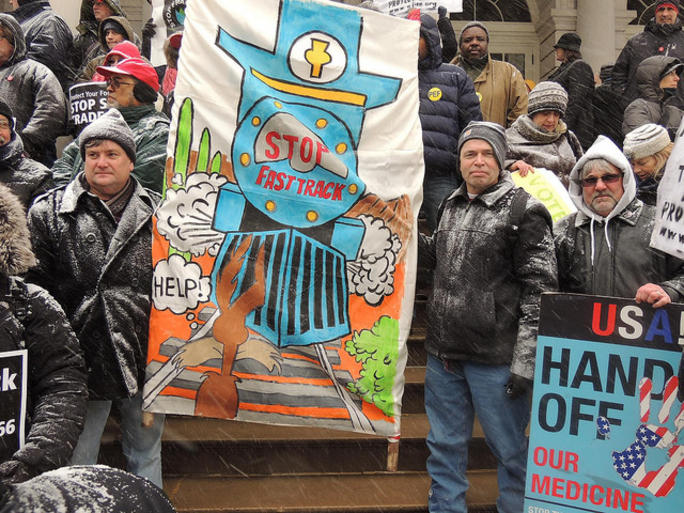Lawmakers grapple with ‘fast track’ trade bill

WSJ | 24 Feb 2015
Lawmakers grapple with ‘fast track’ trade bill
Possible sweeteners to attract skeptical Democrats include greater access to details of talks
By WILLIAM MAULDIN
Lawmakers from both parties are trying to strike a difficult balance as they wrangle over the final intricacies of a bill that would expedite consideration of trade deals.
House and Senate leaders crafting the so-called fast-track bill want to include sweeteners to attract skeptical Democrats, including rules to allow lawmakers greater access to the details of continuing trade negotiations.
But supporters fear too many provisions friendly to Democrats could alienate Republicans and the business community, or even put a major Pacific trade deal at risk when it comes up for a final vote. The U.S., Japan and 10 other Pacific Rim countries are hoping to agree to the final terms of the trade partnership in coming months.
To smooth passage of the Trans-Pacific Partnership, or TPP, the Obama administration hopes to win fast-track authority that would allow Congress an up-or-down vote on trade deals without amendments.
Many Democrats, though, fear the terms of a fast-track bill would deprive them of leverage to help mold the contours of the Pacific pact before it arrives in Congress for a final vote.
The bill’s authors—Sen. Orrin Hatch (R., Utah), Sen. Ron Wyden (D., Ore.) and Rep. Paul Ryan (R., Wis.)—are now fighting over how much leverage to give lawmakers to remove any coming trade deals from fast-track protection. That would subject the pacts to ordinary amendments and procedural delays.
In general, Republicans don’t want to insert a mechanism that makes it easier to defeat trade agreements.
Another contentious issue is exactly who on Capitol Hill can see—and take notes on—the Obama administration’s latest negotiating positions. Lawmakers can currently request to examine the negotiating text, but typically they can’t bring along aides.
Some Democratic lawmakers and trade-deal critics want more openness and say the current policy prevents Congress from serving as a watchdog over trade deals. Business groups counter that the negotiations involve trade secrets and sensitive negotiating positions that are expected to change.
Mr. Ryan and people following the negotiations for fast track, which is also known as trade-promotion authority, say there is broad agreement to boost access to the text on Capitol Hill.
Still, it is unclear whether such changes will be enough to convince liberal Democrats that their concerns are being addressed.
Observers say the legislation has a fair chance of getting through the House: Even if 40 Republicans vote against the bill, the measure could still pass with just a dozen Democratic votes. In the Senate, the bill could achieve the 60-vote threshold to advance if Mr. Wyden and like-minded Democrats on the Finance Committee support it.
The legislation also sets negotiating objectives for the administration, ranging from protecting intellectual property in medicines to working to avoid currency manipulation by trading partners.
But the priorities aren’t binding, and adding more negotiating objectives could complicate a final vote on the TPP or another agreement. “These negotiating objectives will only be put in if they deliver votes,” said Gary Hufbauer, senior trade expert at the Peterson Institute for International Economics, a Washington think tank that backs removing trade barriers.
Mr. Wyden, the top Democrat on the Senate Finance panel, is betting that more Democratic priorities, including strong trade enforcement, will help win support among Democrats in the Senate and House, observers say.
“I am pushing hard for more transparency and oversight in trade negotiations, much stronger enforcement of the rules to hold trade cheats accountable, strong protections for labor, human rights and the environment,” Mr. Wyden said in a statement.
So far, House Minority Leader Nancy Pelosi (D., Calif.) and Minority Whip Steny Hoyer (D., Md.) have kept their powder dry, saying there is a “path” to Democratic support.
“There aren’t a whole lot of Republicans that are going to drop off if this gets a whole lot more ‘Democrat,’ ” said Dan Ikenson, director of the trade studies center at the Cato Institute, a libertarian think tank. “If Pelosi and Hoyer support this, then that means more Democrats can come along.”
Republicans also have priorities, and Mr. Hatch has repeatedly backed long-term protection for biologic drug rights, upsetting some lawmakers who worry the deal will limit access to drugs in Vietnam, Malaysia, Peru and other poor countries in the TPP.
One big bipartisan concern is how to address alleged currency manipulation by trading partners. Lawmakers in both chambers have signed letters asking the administration to address the issue within the Pacific deal, but U.S. trade representative Mike Froman and Treasury Secretary Jacob Lew say they prefer to deal with the issue through diplomatic exchanges, including the International Monetary Fund and the Group of 20 biggest economies.
Lawmakers this month introduced bills into both chambers of Congress that would allow U.S. companies to petition the government to punish rivals overseas when there are signs of currency manipulation to gain trade advantage.
The separate legislation may assuage some members, but probably not the Detroit auto industry or key Democrats and Republicans from districts who have lost the most manufacturing jobs to Japan or China, which is included in the TPP, lobbyists say.
Write to William Mauldin at william.mauldin@wsj.com





